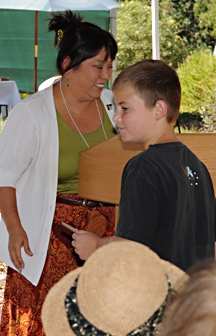Some 1300 people, including beekeepers, entomologists, gardeners, nature lovers, and children--plus millions of bees in the vicinity--helped celebrate the grand opening of the Häagen-Dazs Honey Bee Haven last Saturday, Sept. 11.
The haven, a bee friendly garden planted last fall next to the Harry H. Laidlaw Jr. Honey Bee Research Facility on Bee Biology Road, University of California, Davis, looks glorious in its fall colors, including oregano, purple coneflowers, Mexican hat flowers and sedum.
A highlight of the grand opening: the speech delivered by Dori Sera Bailey, director of consumer communications, Häagen-Dazs and Dreyer’s Grand Ice Cream. The company provided free ice cream to the crowd.
"It's so nice to see so many families here today," she began, then asked "Who can tell me why protecting honey bees would be important to Häagen-Dazs ice cream?"

"In fact," said Bailey, praising him for his answer, "more than than half of our 60 flavors of ice cream, sorbet, frozen yogurt and ice cream bars are what we call 'Bee Built.' That means they’re made with fruits, berries and nuts, pollinated by honey bees."
She went on to add that "while we’re all about ice cream, we also recognize that without honey bees we would lose one-third of all the natural foods we eat. Think about that when you’re eating dinner. One out of every three bites you take came from the efforts of honey bees and other pollinators."
"That’s why my friends and I at Häagen-Dazs," Bailey said, "are so pleased to sponsor the Haagen-Dazs Honey Bee Haven. It’s only appropriate that we created a beautiful source of food for the bees who bring us peaches, tomatoes, carrots, cantaloupe, onions and cherries. I understand more than 6 million bees are dining in this Haven."
"By helping honey bees we can help ensure a safe and bountiful food supply for all. And that’s a contribution we can make that benefits all Americans. In that spirit, we are very pleased to announce that Häagen-Dazs will be donating another $50,000 to UC Davis in 2011 for continued honey bee research and support."
Bailey ended her presentation on another sweet note: "Thank you for coming today. Thank you to our partners at UC Davis and the many others who have toiled over the last two years to design, plant, nurture and give life to this garden. We thank you all, on behalf of Raspberry Sorbet, Rocky Road and Cherry Vanilla. Enjoy the garden . . . and the Häagen-Dazs."
The crowd did. It was a honey of a garden celebration.
Attached Images:

Beekeeping Chat

Beekeepers

Native Pollinators

Surrounded by Sedum

Bee observation hive